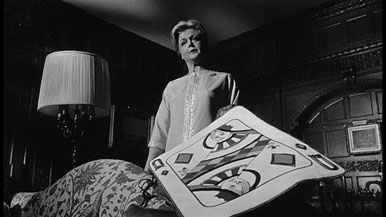Before Their Time: The Manchurian Candidate (1963)
By Daniel MacDonald
May 28, 2009
BoxOfficeProphets.com

Based on Richard Condon's novel from two years earlier, The Manchurian Candidate involves a convoluted brainwashing scheme that can turn a celebrated war hero into the coldest of assassins at the sight of the Queen of Hearts in a deck of playing cards. Power-hungry families, hysterical fear of communism, the nature of memory, weaknesses of the human mind, and a touch of incest all come into play by the time it's over. The rather unwieldy tagline is accurate: "If you come in five minutes after this picture begins, you won't know what it's all about! When you've seen it all, you'll swear there's never been anything like it!"
Frankenheimer opens this black-and-white classic during the Korean War, with a platoon of Americans enjoying some down time in a brothel. Staff Sergent Raymond Shaw (Harvey) busts up the fun, and the group heads out for a nighttime maneuver based on information from a Chinese informant. Without warning, the platoon is ambushed, and the screen fades to black. The next thing we know, Shaw is exiting a plane to fanfare and a Medal of Honor for having rescued the others after nearly three years in a POW camp. Elsewhere, Shaw's former Commanding Officer Ben Marco (Sinatra) has been having vivid nightmares of a united Chinese/Russian contingent brainwashing his platoon, forcing Shaw to kill two of his fellow POWs while the others look on, and Marco has reason to believe it might not all be a dream.
These first few minutes are simply masterful storytelling. They set up a surprising number of plot threads that will take the next two hours to play out, effortlessly sinking the audience into a world of multiple meanings and few easy answers. The brainwashing nightmare sequence is the highlight of the piece, an astounding achievement in editing that boils a complex conceit down to an easily-digestable form. The soldiers believe they are killing time at a garden party listening to a woman give a dull lecture about hydrangeas, but in fact they're in a communist stronghold, the audience of little old ladies actually members of the Russian and Chinese armies. The scene cuts seamlessly between the facade and reality - we're at the garden party hearing the lecture from the gardiner, then we're in the bunker as the soldiers are manipulated by a villainous communist, then the gardening expert is in the bunker doing the manipulation and so on. Words don't do justice to the sheer originality of visual storytelling at play here, but I guarantee it will sell you on this movie's importance.
Frankenheimer's command of the filmmaking craft is well documented, and he surely inspired generations of auteurs with his cinematic slight-of-hand. Cutting his teeth in television, Frankenheimer regularly employed moving sets, odd angles, and precise choreography to ensure the action in the frame was as interesting as can be; his influence can certainly be seen in George Clooney's directorial debut, Confessions of a Dangerous Mind, which is filled with in-camera effects to give the movie both playful energy and dramatic heft. Frankenheimer's style was well suited, then, for this talky picture where so much depends on the audience's grasp of complex concepts and subtle humor. One of the most impressive shots comes when Shaw's plane lands after he returns from overseas: we begin on a thumping base drum, and the camera pulls back revealing more and more of the crowd that has gathered to witness this homecoming, to the point where it's nearly impossible to tell where the shot began. Later, Shaw's stepfather - Senator Iselin - rallies against supposed communists in the senate, and in case the cadence of Iselin's voice doesn't clue us in to the skewering of Joseph McCarthy, the angles Frankenheimer chooses seal the deal. Each composition is thoughtful, and always serves the story.
2004 saw director Jonathan Demme bring a remake to the screen featuring a substantial lineup including Denzel Washington, Meryl Streep, Jeffrey Wright, and Liev Schreiber. It was a great thriller, thoughtful and intense, but the stakes and emotions are amped up compared to the original, making it stand on its own feet as an adaptation of the novel rather than a slavishly carbon-copy. With Washington playing Marco, the role is bigger and more integral to the film's conclusion than that played by Sinatra, and the details of the brainwashing are more graphic. It's well worth your time, but I recommend starting with the original first to get the most out of both pictures.
It took some time for The Manchurian Candidate to really get its due. The picture had a theatrical release (albeit a protracted one) in 1962; from there it was mostly relegated to CBS and ABC movie-of-the-week showings, especially after the rights to the film went to Sinatra in the '70s. It was well regarded by critics, and both Angela Lansbury and film editor Ferris Webster were nominated for Academy Awards, but wasn't added to the National Film Registry until 1994. Popular belief holds that Sinatra withdrew the movie from circulation out of respect for JFK, re-releasing it in a 1988 theatrical run, but this is dismissed as fiction in some circles. The most likely explanation seems to be that a dispute over royalties between Sinatra and the producers led to The Manchurian Candidate's troubled release, and contributed to it being undervalued.
This is a must-see for casual movie fans and aspiring filmmakers alike. It handily presents the book's complex narrative, features supurb performances across the board, and, most impressively, makes solitaire breathlessly cinematic. If you haven't seen this one, find it and watch it.